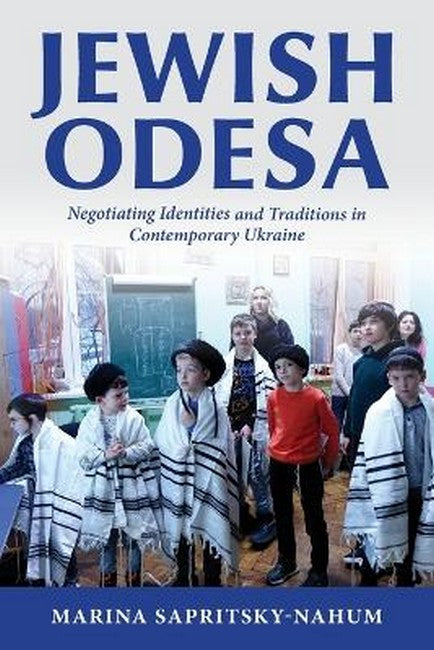Marina Sapritsky-Nahum is a social anthropologist based in London, UK. She is Visiting Fellow at the London School of Economics and Honorary Senior Research Associate at University College London. She is also affiliated with the European Center for Jewish Music in Hannover, where she is currently conducting research on Ukrainian Jewish cultural heritage and writing more broadly about the effects of war on Jewish life in Ukraine.
Request Academic Copy
Please copy the ISBN for submitting review copy form
Description
Preface Acknowledgments A Note on Transliteration and Translation Introduction: A Jew in a Kippah 1. Historical Background: The Lost, the Revisited, and the Recreated 2. Remembering the Past and Making Sense of the Present: Narratives of Elderly Jews 3. From Evrei to Iudei: Turning or Returning to Faith? 4. Asymmetric Cultural Encounters: Jewish Philanthropy Missions and Revival on Display 5. "Jewish Is a Mode of Transportation": Between Home, Homeland, and Diaspora 6. Odessa: A Jewish City? Conclusion: Negotiating Traditions Epilogue Notes Bibliography Index
"Marina Sapritsky-Nahum's Jewish Odesa: Negotiating Identities and Traditions in Contemporary Ukraine is an extremely interesting and analytically rich ethnographic study of the Jews in Odesa in the early twenty-first century. Sapritsky-Nahum explores such important issues as the meaning of home and homeland, diaspora, religious revival, Jewish tradition, and the role of the "Odesa myth" in the identities of the Jews who reside in the city. According to this myth, Odesa was a Jewish city because it was open, tolerant of ethnic diversity, and cosmopolitan. That identity began to change after the fall of Communism as Jews primarily from Israel and the United States came to Odesa to introduce new ways of being Jewish. Their efforts were only partially successful, as Odesan Jews struggled with conflicting ways of being Jewish, Russian, and Ukrainian in the post-Soviet world. Beautifully written, Jewish Odesa is a serious scholarly book that is utterly accessible to non-specialists."-Marsha L. Rozenblit - University of Maryland "A beautiful, empathetic, rich ethnographic portrait of Jewish life at a unique moment in the history of a city that has nurtured many, many Jews of world historical significance. The importance of this manuscript as a document of Odessan and post-Soviet Jewish life in the mid 2000s cannot therefore be overstated. . . Its value lies precisely in the prominence given to the voices of the people Sapritsky-Nahum spoke with, and the way in which she weaves their voices into a narrative that engages with bigger processes of political economic dislocation, desecularization, and nation-building and academic debates about them."-Tanya Richardson - Wilfrid Laurier University "This is an incisive analysis of the home/diaspora model, sharpened by the inclusion of a short epilogue chapter that considers the ongoing war in Ukraine. Sapritsky-Nahum considers the ways the war has shaped and altered Jewish Odesan perceptions of nationhood and belonging due to their liminal placement between so many categories: Jewish, Odesan, Ukrainian, or Russian-speaking, to name a few."-LSE Review of Books

